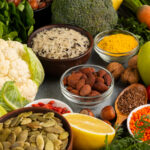
Heartburn is a common and uncomfortable sensation caused by stomach acid moving up into the esophagus. It creates a burning feeling in the chest and throat, often triggered by certain foods. While many foods can make heartburn worse, there are also many that can help prevent or alleviate symptoms. By making informed dietary choices, you can reduce the frequency and severity of heartburn. In this article, we will explore foods that can help fight heartburn, how they work, and other helpful tips for managing acid reflux.
Understanding Heartburn and Acid Reflux
Heartburn occurs when the valve between the stomach and esophagus (the lower esophageal sphincter) doesn’t close properly, allowing stomach acid to back up into the esophagus. This acid can irritate the lining of the esophagus, causing discomfort. Common triggers include overeating, eating spicy or fatty foods, drinking alcohol, or consuming caffeine
Best Foods to Relieve Heartburn
Choosing the right foods can go a long way in preventing and managing heartburn. Below are some of the best foods that can help relieve the symptoms of acid reflux:
1. Bananas
Bananas are low in acidity and provide natural antacids that can help coat the stomach lining. They are a great snack for people who suffer from heartburn because they soothe the esophagus and prevent acid buildup.
2. Melons
Melons like watermelon, cantaloupe, and honeydew are also low in acid, making them an excellent choice for preventing heartburn. They hydrate the body and promote better digestion.
3. Oatmeal
Oatmeal is a high-fiber food that can help absorb stomach acid. It’s a great breakfast option because it’s filling and doesn’t trigger reflux symptoms.
4. Whole Grains
Whole grains like brown rice, couscous, and whole wheat bread are great sources of fiber and can help keep your digestive system running smoothly. Fiber helps to prevent acid reflux by aiding digestion and reducing the pressure in the stomach
RELATED : natural pain relief foods that fight inflammation
5. Green Vegetables
Vegetables such as broccoli, asparagus, green beans, and spinach are low in fat and acid, making them perfect for managing heartburn. They are also rich in nutrients and help support overall digestive health
6. Lean Proteins
Lean meats like chicken, turkey, and fish are lower in fat than red meat, which can trigger acid reflux. Stick to grilling, baking, or broiling these meats to keep meals healthy and reflux-friendly.
7. Ginger
Ginger is known for its anti-inflammatory properties and is often used to ease digestive discomfort. It can help reduce heartburn by calming the stomach. Try sipping ginger tea or adding fresh ginger to your meals.
8. Aloe Vera
Aloe vera juice can be used to soothe the digestive tract. It has anti-inflammatory properties that help heal irritation caused by acid reflux. Be sure to choose aloe vera juice that is specifically formulated for internal use.
9. Egg Whites
Egg whites are a great source of protein without the fat found in the yolks, which can trigger acid reflux. They are versatile and can be used in various dishes without causing symptoms
10. Healthy Fats
Not all fats are bad for heartburn sufferers. Healthy fats like those found in avocados, olive oil, and nuts can be consumed in moderation without triggering acid reflux. These fats can actually help maintain a healthy digestive system.
Foods to Avoid
Just as certain foods can help alleviate heartburn, others are known to trigger symptoms. It’s important to be mindful of these foods and avoid them if you’re prone to acid reflux:
- Citrus Fruits: Oranges, lemons, limes, and grapefruits are high in acid and can irritate the esophagus.
- Tomatoes: Tomatoes and tomato-based products like pasta sauce and ketchup can trigger reflux due to their high acid content.
- Fried and Fatty Foods: These take longer to digest and can increase stomach acid production, leading to heartburn.
- Chocolate: Unfortunately, chocolate can relax the lower esophageal sphincter, allowing stomach acid to flow back into the esophagus.
- Spicy Foods: Spicy dishes can irritate the lining of the stomach and esophagus, making heartburn symptoms worse.
- Caffeine: Coffee, tea, and caffeinated sodas can increase acid production in the stomach and relax the esophageal sphincter.
- Alcohol: Alcohol can weaken the muscles around the esophagus, allowing stomach acid to escape and causing reflux
RELATED : foods that help fight fat effectively
Tips for Managing Heartburn
While adjusting your diet is an essential step in managing heartburn, there are other lifestyle changes that can further help reduce symptoms:
1. Eat Smaller Meals
Eating large meals can increase pressure on the stomach and lead to reflux. Opt for smaller, more frequent meals to avoid overloading your stomach with food.
2. Stay Upright After Eating
Avoid lying down or reclining right after eating. Instead, stay upright for at least two to three hours to prevent acid from moving up into the esophagus.
3. Avoid Eating Late at Night
Late-night snacking or heavy meals before bed can increase the risk of reflux. Try to eat dinner at least three hours before bedtime
4. Maintain a Healthy Weight
Excess weight can put extra pressure on your stomach, pushing acid into the esophagus. Losing weight, if necessary, can reduce the frequency of heartburn.
5. Elevate the Head of Your Bed
If you suffer from nighttime heartburn, consider raising the head of your bed by six to eight inches. This helps gravity keep stomach acid in place.
6. Quit Smoking
Smoking weakens the lower esophageal sphincter, making it easier for acid to back up into the esophagus. Quitting smoking can improve overall digestive health and reduce reflux.
When to See a Doctor
While occasional heartburn is common, frequent or severe symptoms may indicate gastroesophageal reflux disease (GERD). If you experience heartburn more than twice a week, have difficulty swallowing, or notice weight loss, it’s important to consult a healthcare provider for further evaluation. Untreated GERD can lead to more serious complications, such as esophageal damage.
The Takeaway
Heartburn can be managed effectively with the right diet and lifestyle changes. Incorporating low-acid, high-fiber foods, and lean proteins can help reduce symptoms, while avoiding known triggers is key to preventing heartburn flare-ups. Additionally, adopting healthy habits such as eating smaller meals, maintaining a healthy weight, and avoiding late-night eating can further alleviate discomfort. By making these adjustments, you can significantly improve your quality of life and reduce the impact of heartburn on your daily routine.
If your heartburn persists despite dietary changes, don’t hesitate to seek medical advice. Managing heartburn early can help prevent more serious digestive issues in the future
Frequently Asked Questions
- What foods help reduce heartburn?
Foods that help reduce heartburn include high-fiber options like oatmeal, lean proteins such as chicken and fish, non-citrus fruits like bananas and melons, and green vegetables like broccoli and spinach. - What foods should I avoid if I suffer from acid reflux?
To prevent acid reflux, it’s best to avoid spicy foods, citrus fruits, chocolate, caffeinated beverages, and fatty or fried foods, as they can trigger heartburn symptoms. - Can eating smaller meals help with heartburn?
Yes, eating smaller, more frequent meals can prevent your stomach from becoming too full, which reduces pressure on the lower esophageal sphincter and helps minimize heartburn. - Are there any drinks that help with heartburn relief?
Herbal teas such as chamomile or ginger tea can help soothe heartburn symptoms. Additionally, drinking plenty of water can aid digestion and reduce acidity in the stomach.











